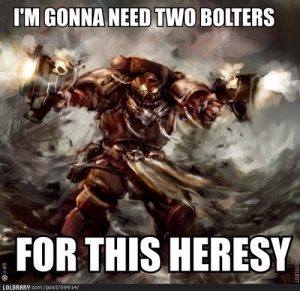The Magic of Warhammer 40K
If you want to shoot 3d4 magic missiles and colorful sprays of light from your hands, you play D&D. If you want to burst open the heads of your enemies like ripe melons with the psychic equivalent of the Tsar Bomba, you play Warhammer 40K.
Warhammer’s worldbuilding has become stunningly well-developed over the past thirty years, from the galaxy-spanning star maps down to the chapter-specific patterns on a Space Marine’s knee armor. Only the minds of tabletop wargaming hobbyists could create a universe this minutely detailed—and then take joy in painting every centimeter of it.
I’ve been talking about fantasy magic systems in this column, but Warhammer’s sci-fi equivalent to magic deserves a special exception. Get ready for some heresy.

THE WARP
In the Warhammer 40K universe, reality is undergirded by the Warp, a dimension where all the desires, fears, and emotions of sentient beings are converted into pure energy. Likewise, each of the four Chaos gods and their demonic servants (who dwell in the Warp) are manifestations of the deep-seated fears and desires within the minds of humans and aliens: Khorne represents senseless murder and destruction, Tzeentch represents ambition and scheming, Slaanesh represents pleasure and pain, and Nurgle represents death and sickness.
What’s fascinating about the Warp is that it’s only a roiling, chaotic hellscape filled with demons and dark gods because the species of the universe have made it that way: as the Games Workshop slogan goes, “In the grim darkness of the far future, there is only war.” All that destruction, death, pain, and greed gets funneled into the Warp, empowering the Chaos gods and giving them the ability to perpetuate themselves by creating their own nightmarish campaigns of carnage and destruction. It’s like the Circle of Life, but horrifying.
The other interesting thing about the Warp is that it’s almost wholly psychic. Instead of being based on earth, fire, air, and water or some kind of Wheel of Time-style cosmic dualism, the metaphysical structure of the Warp is tied to the mind, and changes in the mental state of cultures, planets, or races can change the Warp itself. According to some canons, the Chaos gods came into being over the course of humanity’s development, with each one representing a major shift in humanity’s consciousness–the trauma of the Black Plague, for example, supposedly brought Nurgle into being. Slaanesh, meanwhile, was born out of the decadence of the Eldar race about 10,000 years before the current events of the canon.
All of this boils down to one idea: the universe of Warhammer 40K, including the magic, metaphysics, and the gods, is almost wholly shaped by the minds of its species. There is no divine plan, no omnipotent god watching over all creation, and no meaning to life, other than what the races believe.
You might argue that the Emperor and Omnissiah are real gods, but everyone knows the Corpse-God sits on a throne of lies and the Machine God is a false idol propagated by the tech-priests of Mars.

PSYKERS
“Magic” in Warhammer is treated with a mix of scientific rigor and occult reverence, and it bears a strong resemblance to H.P. Lovecraft’s work—especially when it comes to madness. When a psyker or sorcerer performs magic, they tap into the Warp’s energies, which apparently feels like looking through the Stargate in 2001: A Space Odyssey:
Impossible light flooded into Flense’s skull. For one second, he saw eternity. He saw the angles of space, the way they intersected with time. He saw the tides of the Empyrean, and the wasted fringes of the Immaterium, the fluid spasms of the Warp. He saw his mother, his sister, both long dead. He saw light and darkness and nothingness. He saw colours without name…He saw a red-dark sky and an impossible number of suns. He saw a star overload and collapse. He saw—
Too much.
Just glimpsing the Warp for a moment causes Draker Flense, a normal human, to soil himself. Even worse, once a psyker taps into the Warp they begin to attract demons, who try to possess the psyker and use them as psionic weapons or living gateways to cross over into reality. Sanctioned human psykers are taught strict mental discipline to resist these attacks, but latent psykers are still vulnerable. Those psykers act more like madmen or shamans: they have subtle, magical powers like prophecy or telekinesis, and enter trances that can cause them to foam at the mouth or start speaking in tongues.
Of course, it wouldn’t be Warhammer if psykers weren’t turned into living psionic weapons. Some of the most common types of psyker “schools” of magic include biomancy, divination, pyromancy, telekinesis and telepathy, with each one finding its own unique place on the battlefield: pyromancers can shoot “Warp-fire” out of their mouth and eyes, become miniature supernovae, and incinerate enemies with beams of heat, while telekinetic psykers can bend space and time to teleport themselves or rip open giant, swirling vortexes in reality that suck enemies into the Warp. Servants of Chaos have even crazier powers–Nurgle’s sorcerers, for example, can reduce enemies to diseased slag or tear at the souls of human victims with horrible, enchanted bells.
Every time a psyker uses their abilities, however, there’s a greater and greater chance that something horrible can happen–failing to channel a telekinetic spell can create a psychic backlash that overloads the psyker’s mind and kills everyone in a 50-foot radius, while losing control of Warp-fire can incinerate the caster like a match. Nobody wants to be that mustached guy in Scanners, so it’s understandable that most soldiers don’t like having a psyker around.
https://www.youtube.com/watch?v=qnp1jfLhtck
FEAR THE PSYKER
Most humans see psykers’ abilities as a kind of voodoo, tied up with folk magic and superstition, and the Imperium of Man’s theocratic government is more than happy to take on the role of the Catholic church, perpetuating the myth that all magic is demonic heresy and burning psykers at the stake like witches. There are covens and cults, as well as demon-worshipping conspiracies, however—the occult aspects of magic are very real, including things like rituals, invocations, and sacrifices. As mentioned before, any psyker can become a host for demonic possession, so the witch-hunts are slightly understandable. But that’s not the whole picture.
The initiated scholars, technologists, and military leaders of the Imperium see the Warp as a phenomenon that can be harnessed like electricity or relativity: psykers called astropaths are at the heart of faster-than-light travel and galactic communication networks, and thousands of psykers are sacrificed to the corpse-like Emperor of Man’s Golden Throne to keep his consciousness alive. Most knowledge about the nature of the Warp is purposefully kept secret from the civilians of the Imperium—it’s more convenient if the masses still see it as just witchcraft.
Here’s a great excerpt that shows the inner monologue of a Librarian, a pysker-space marine:
Call us what they will, be it witchkin, witchblood, blackfate or any other name; it is we who hold this Imperium together, even as fools shrink from us and make the warding sign over their hearts when we pass.
He had tried to understand the fear and contempt others bore towards his kind, but they had never known the invigorating sense of freedom and strength his power gave him. To him it seemed that the lives of the ungifted were lived blind. They missed so much that was all around them. They would never see the coruscating aura that flickered and danced like living flame around ancient artefacts that had belonged to heroes or saints.”
Even if demons don’t corrupt a psyker, you can see how the megalomania could.
THE WARP: A MIRROR OF THE SOUL
At its most basic level, Warhammer 40K’s magic is unique because it is neither wholly magic nor wholly science. This can create some confusion, since an engineer can use mathematics and physics to design a spaceship that can sail on the Warp like a giant ocean, while a cultist chanting incantations can use the Warp to imbue a sword with demonic power. How can sci-fi tech and occultism co-exist? Wouldn’t science do what it did in our timeline and convert what people call “magic” into an orderly, logical system? What’s the real nature of the Warp? These questions end up revealing Warhammer’s genius when it comes to building a magic system.
In a nutshell, the Warp gives reality some malleability. Granted, certain aspects of the Warp don’t change: it underlies our dimension, it turns thoughts, acts, and emotions into energy, and that energy can take on forms (like demons) or become channeled by a psyker. Everything after that, however, is determined by our own beliefs: when enough people believe something deep down in their soul, like how sacrificing a goat will summon a demon, that belief is given power in the Warp. This means the quest to understand the Warp will inevitably lead the seeker back to their own mind, along with all the desires, deep-seated fears, and close-held beliefs that make them who they are. No one can be completely objective when it comes to examining their own mind, and so the Warp will always escape understanding, ensuring there’s always an element of mysticism and mystery to magic.
All this brings us back to the tragedy of Warhammer: if everyone would just stop glassing each other’s planets for five minutes, they could break the cycle of terror, greed, and mutual genocide, which would open an opportunity to gradually change the Warp from a psychic hellscape into a dream-like paradise. The Chaos Gods would wane in power, and the wars would end. It’s just like John Lennon told us in Imagine:
Imagine there’s no heaven
It’s easy if you try
No hell below us
Above us only sky
Imagine all the people living for today
What a wonderful galaxy that would be. Of course, we’d have to kill the Orks first–those filthy psychopaths would kill everyone at the first sign of a truce.

As someone just getting into this I found it a great article. Currently trying to build a necron army and astra Militarium army.
[…] you want to get a handle on the lore, I wrote this article on the magic of Warhammer (which gives some insight into the universe), but the basic idea is […]
[…] The Magic of Warhammer 40K […]